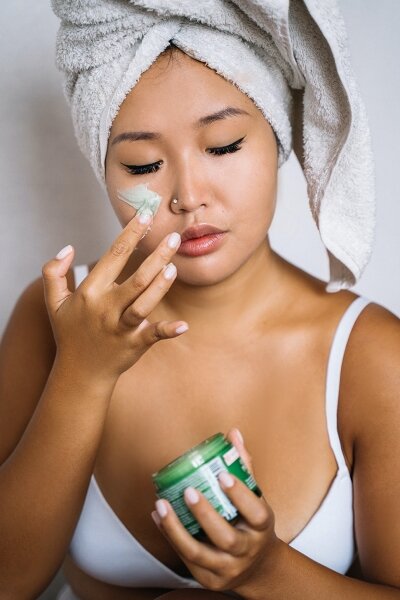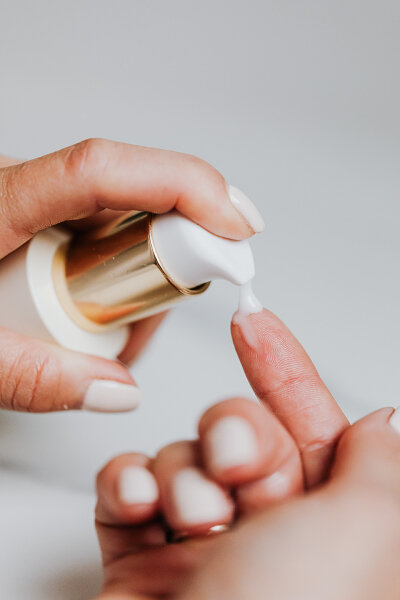There are a lot of holy grail skincare ingredients that are vying for a place in your skincare routine, but retinol is one that should definitely have a reserved spot in the lineup.
Retinol's benefits and efficacy are widely supported by scientific research and dermatologists, so it's not just a buzzy skincare ingredient.
Below, we spoke with Dr. Ker Khor Jia, Medical Director of Dermatology and Co to discover everything there is to know about retinol.

Retinol and other retinoids can help maintain the skin’s youthful appearance.
What is retinol: retinoid vs. retinol?
"Retinoids are vitamin A derivatives. In skincare, this is converted into retinoic acid for therapeutic purposes," Dr. Ker explained. "'Retinoid' is an umbrella term for both over-the-counter retinol and prescription-grade retinoids. Retinol is a type of retinoid used in over-the-counter products."
You may have seen retinol and retinoids used interchangeably, but there's a significant difference between the two and it lies in their concentration. "Retinol is a weak retinoid and contains a much lower concentration of the active retinoic acid ingredient, which allows most consumers to tolerate it in skincare products. Prescription-grade retinoids have a much higher concentration of the active retinoic acid ingredient and are thus more effective."
Here's how retinoid derivatives rank based on strength (from weakest to strongest): retinyl esters, retinal, retinol, adapalene (which straddles the line between non-prescription and prescription retinoid), tretinoin, tazarotene, and trifarotene.
"I will recommend prescription-grade retinoids as they are more effective than over-the-counter retinol products. Speak to your dermatologist and start with a low-concentration retinoid with 0.01% or 0.025% concentration. The maximum concentration is 0.1%."
The benefits of retinoids
"Retinoids help to stimulate cell renewal and thus promote collagen growth of the skin, which improves wrinkles over time," Dr. Ker explained. "Skin texture will be better."

Dermatologists would often prescribe higher-concentration retinoids as part of an acne treatment program.
They also help to lighten pigmentation and get rid of blocked pores (comedones), so dermatologists can also prescribe retinoids as part of an acne treatment regimen. "Oral retinoids are used for the treatment of severe acne and psoriasis by regulating cell turnover." In fact, Dr. Ker said that retinoids can be started in the teenage years when there may be acne, and to be continued till adulthood. However, she advises against it for females who are pregnant or breastfeeding. The hormonal imbalances from pregnancy can make your skin more sensitised towards active ingredients like retinol.
Retinol's benefits will be particularly of interest to those looking to significantly change the quality of their skin texture in a relatively short amount of time compared to over-the-counter skincare. If you're looking to maintain the skin's youthful appearance, you can start with serums or moisturisers infused with retinol.
How to correctly apply retinol

All you need is a small amount of retinol to enjoy its benefits.
Once you have your retinol serum or cream ready, use a tiny pea-sized amount at night — since sunlight degrades retinoids — after applying a rich non-comedogenic moisturiser. Avoid applying it too close to the corners of the eyes, nose and mouth.
"If your skin is sensitive you may want to start off with twice a week application. After two weeks, if there is no redness, dryness or itching, you can increase it to three times a week and then nightly thereafter."
Don't go ham on the amount of retinol, since this won't boost its efficacy. In fact, it increases the chances of irritation instead. Also, don't forget to put on sunscreen the morning after since retinol can make you more prone to sunburn.
Some over-the-counter retinol products we have personally tried at TheBeauLife include Kiehl's Retinol Skin-Renewing Daily Micro-Dose Serum and the innisfree Retinol Cica Repair Ampoule.
What to expect after starting your retinol journey
Since retinoids act quickly, you will experience some skin "purging" in the first few weeks of using the product. "Where you can get acne outbreak in people with acne-prone skin, retinoids are also clearing out the pores. Do not be worried and persist; this will clear up," Dr. Ker explained.
You should also know that there's no such thing as being allergic to retinol. "It's more of skin irritation due to incorrect method of usage. If you develop redness, peeling, flaking, itchy skin then you could be sensitive to retinoids, reduce the frequency and use a rich moisturiser prior to retinoid application," Dr. Ker advised.
Everyone can benefit from adding retinol to their skincare rotation as long as they're doing everything correctly. "I will suggest it as part of a daily skincare regime to stimulate cell renewal and maximise its anti-ageing properties."
Here are some retinol creams you can consider picking up.
Comments, questions or feedback? Email us at [email protected].





